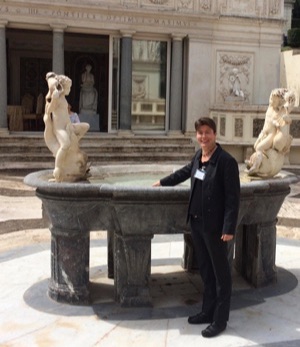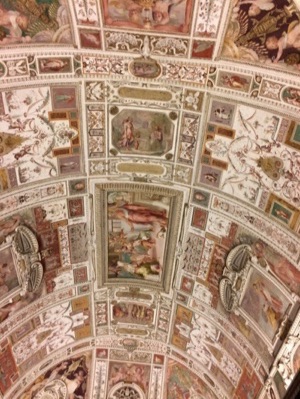Campus News
Jenny Reardon participates in Vatican workshop on personalized medicine
Sociology Professor Jenny Reardon, a leading voice in the field of genomics, was one of 15 participants invited to attend a workshop on personalized medicine hosted by the Pontifical Academy of Sciences.


Jenny Reardon, a leading voice in the field of genomics, was one of 15 participants invited to attend a workshop on personalized medicine hosted by the Pontifical Academy of Sciences.
The workshop, “The Revolution of Personalized Medicine: Are We Going to Cure All Diseases and at What Price?,” took place April 8-9 in Vatican City. With an emphasis on the bioethical complexity of genomics, as well as the technological challenges, the workshop brought together leading minds from around the world to assess this new era in medicine.
Among the attendees were pioneers of the field of genomics, including Eric Lander, a principal leader of the Human Genome Project and president of the Broad Institute; Christopher Austin, director of the National Institutes of Health’s National Center for Advancing Translational Sciences; leaders in medical ethics, including Joseph Fins, chief of the Division of Medical Ethics at Weill Cornell Medical College, and Nobel Laureate Aaron Ciechanover.
Reardon is the author of the 2017 book The Post Genomic Condition: Ethics, Justice, and Knowledge After the Genome and Race to the Finish: Identity and Governance in an Age of Genomics. The founding director of the Science and Justice Research Center at UC Santa Cruz, Reardon brings questions about identity, justice, and democracy to her scrutiny of genomics and the promise of personalized medicine. In 2018, Reardon coauthored an open letter signed by 67 scholars responding to Harvard University’s David Reich’s op-ed in the New York Times about genetics and race.
A persistent advocate for public dialogue about genomics, Reardon was honored to participate in the Vatican workshop. “The Catholic Church reaches millions of people around the globe,” she noted. “How it discusses these issues is very important.”
Reardon said workshop discussions revolved around three areas:
- The relationship between wealth and health, specifically the cost of personalized medicine;
- Governance of science, and the interplay of science and ethics;
- The challenge of evaluating the revolutionary nature of genomics: Is this a paradigm shift in science, or not?
“We had an intense conversation about the governance of science arising out of the CRISPR babies case,” recalled Reardon, referring to the birth of twins in China whose genomes were edited in hopes of protecting them from HIV infection. Despite the 2015 declaration of a public moratorium on this type of work, except in critical cases where there is no other medical treatment available, He Jiankui revealed at the end of November that he broke rank and had used CRISPR to alter the DNA of human embryos. “Now, he is thought to be held under house arrest in China,” said Reardon. “Questions that have arisen in the months since is why other scientists and ethicists who knew about his work did not speak up, and should those who helped him also be held accountable?”
The birth of those babies underscores Reardon’s persistent concern about the need to change the culture and practice of science and engineering to integrate ethical thinking into the process of innovation. “We need to fundamentally rethink and redo scientific responsibility,” she said.
While bringing such a diverse group together always poses challenges, the discussions were productive, said Reardon. “We were thinking big picture, and we were quite frank with each other,” she said. “There were a lot of disagreements, but the biggest questions were on the table. We knew our audience was the Pope.”
Participants engaged deeply with questions of knowledge, as well as governance: “How much can we know from all this genomic information?” said Reardon.
As powerful as the new techniques of genomics are, they also raise questions about the limits of knowing the human body. “There was a time when science thought that once we had those 3 billion nucleotides, we’d have the answers,” she said, referring to sequencing the human genome. “There is now widespread recognition that it is not easy to move from those 3 billion nucleotides to medical insights. Biological life is complex. “
The Vatican was a stunning backdrop to explore such profound questions. “We stayed in the Domus Sanctae Marthae, where the Pope lives, and we ate in the dining room of the Pope’s former residence,” said Reardon, who visited St. Peter’s Basilica and the Vatican Museum. Learning about the Pontifical Academy of Sciences and its reach was fascinating, she noted. “It’s a way for the Catholic Church to have a say in science and be relevant beyond believers,” she said.
Before the workshop began, each of the 15 invitees was asked to submit position papers; Reardon’s paper is entitled, “Genomics’ Problem of Meaning.” Each invitee was also asked to respond to at least two of the position papers before the workshop begins. In both her paper and commentaries, Reardon focused on the problem of meaning created by the early decision in the genomic era to sequence genomic data first—and interpret later.
“The result is that today there exists powerful capacities to sequence data, but not robust abilities to interpret and responsibly govern them,” she said. “Addressing this critical lacuna will require moving beyond the traditional bounds of bioethics—circumscribed by concerns about privacy, consent and property—to ask more fundamental questions of knowledge and justice.”